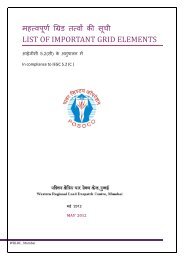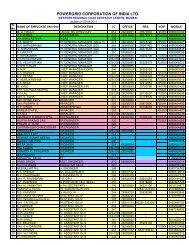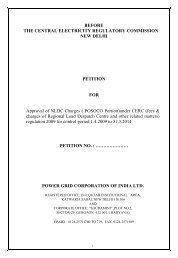ABC of ABT - MP Power generating company limited
ABC of ABT - MP Power generating company limited
ABC of ABT - MP Power generating company limited
Create successful ePaper yourself
Turn your PDF publications into a flip-book with our unique Google optimized e-Paper software.
INTRODUCTIONAWhat is Availability TariffThe term Availability Tariff, particularly in the Indian context, stands for arational tariff structure for power supply from <strong>generating</strong> stations, on acontracted basis. The power plants have fixed and variable costs. The fixedcost elements are interest on loan, return on equity, depreciation, O&Mexpenses, insurance, taxes and interest on working capital. The variable costcomprises <strong>of</strong> the fuel cost, i.e., coal and oil in case <strong>of</strong> thermal plants andnuclear fuel in case <strong>of</strong> nuclear plants. In the Availability Tariff mechanism, thefixed and variable cost components are treated separately. The payment <strong>of</strong>fixed cost to the <strong>generating</strong> <strong>company</strong> is linked to availability <strong>of</strong> the plant, thatis, its capability to deliver MWs on a day-by-day basis. The total amountpayable to the <strong>generating</strong> <strong>company</strong> over a year towards the fixed costdepends on the average availability (MW delivering capability) <strong>of</strong> the plantover the year. In case the average actually achieved over the year is higherthan the specified norm for plant availability, the <strong>generating</strong> <strong>company</strong> gets ahigher payment. In case the average availability achieved is lower, thepayment is also lower. Hence the name ‘Availability Tariff’. This is the firstcomponent <strong>of</strong> Availability Tariff, and is termed ‘capacity charge’.The second component <strong>of</strong> Availability Tariff is the ‘energy charge’, whichcomprises <strong>of</strong> the variable cost (i.e., fuel cost) <strong>of</strong> the power plant for <strong>generating</strong>energy as per the given schedule for the day. It may specifically be noted thatenergy charge (at the specified plant-specific rate) is not based on actualgeneration and plant output, but on scheduled generation. In case there aredeviations from the schedule (e.g., if a power plant delivers 600 MW while itwas scheduled to supply only 500 MW), the energy charge payment wouldstill be for the scheduled generation (500 MW), and the excess generation(100 MW) would get paid for at a rate dependent on the system conditionsprevailing at the time. If the grid has surplus power at the time and frequencyis above 50.0 cycles, the rate would be lower. If the excess generation takes3






